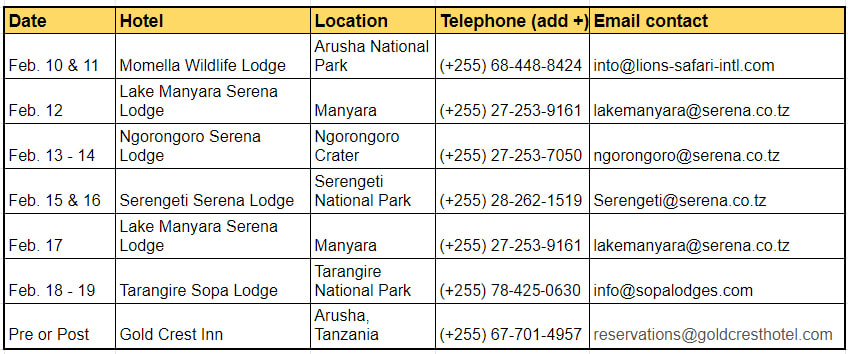|
Here's a safety tip I just lifted from another site you might find helpful. Consider putting the first hotel we'll be staying in after your flight instead of your home address - the airline will be contacting you by phone or email.
"For safety reasons, you should not include your home address on your luggage tag. For the most part, this information is unnecessary since the airline will contact you via phone or email to reunite you with any lost bags. Also, adding your address to luggage tags could open you up to robbery while you’re away as many people could view this information once you’ve headed out on your travels."
0 Comments
Please share this with your family so they can contact you in case of emergency.
NOTE: this has been updated since printing the list included in your final packet as we were notified by Lions Safari that our itinerary has changed. Please make a copy of this for your family and we'll bring a new printed version for you on the trip. We're getting some good questions lately, and even if we've covered many in emails & handbook we realize there is a lot to absorb, so thought we'd post the answers for all of you here on the blog. Check back regularly and we'll keep updating the blog as we get more questions. We don't mind answering as long as you're asking.
1. Will the lodges have hair dryers in the bathrooms? ANSWER: yes, I asked Keven, of Lion's Safari and he assured me they do provide them. 2. Should we drink bottled water & boiled water? ANSWER: yes, for sure, be careful about the water. We will have bottled and boiled water provided with meals and on the safari. 3. What about bathroom stops? If we have to stop frequently what will happen on the game drive? ANSWER: provisions will be made for those whose bladders are in need of frequent stops. You can let us know if this is a problem for you and we may have a van organized with that need in mind. Mark feels your pain and empathizes, so don't hesitate to let him know if you are in that camp. 4. Will there be a shuttle at the airport to take us to the hotel? ANSWER: yes, I sent you all that information and if you didn't get it, call me or look at this blog where there is another post with that information. 5. What about tips? Are you paying them? ANSWER: You need to provide at least $150 per person for your guide and if he does an excellent job and you would like to provide additional reward, it would be very appreciated. Hotel and restaurant tips are up to you. 6. Will we be able to get Tanzanian Shillings when we arrive? ANSWER: yes, we advise you to have a debit card with a pin number to be able to withdraw money from debit machines or banks. Laundry services, tips and souvenirs are all best paid in shillings. We suggest you get approximately $100 in shillings for sundry purposes. 7. Will we need to be tested if we have had a covid vaccination, but not the latest booster? ANSWER: No... not at this time. 8. What gifts should we bring for the school children? ANSWER: This is totally optional, but we suggest crayons, colored pencils, paint brushes, paints, coloring books, sticker books, drawing books, reading books, etc. Don't bring too much. Keep it simple. There are 35 of us, so if everyone brings a little bit it adds up. Text me at 801.669.1777 with any questions you still have and we'll answer them. (liz) We will be attending church in Arusha the first Sunday of our Safari. Here's a photo of members of the branch we'll be meeting. Such a wonderful opportunity to meet with Brothers and Sisters in Tanzania.
Here's the latest: https://tz.usembassy.gov/covid-19-information/
From what we are reading, it appears there is testing at the airport at JRO, however, we are double checking to be sure that is going to be available when our flights arrive in the evening. We will update you as soon as we know. Please check to make sure we have your arrival time and airline correct. Contact Liz if there is an error so we can make the needed corrections. We will include this in the handbook so you can look out for each other the flights.
 PACK LIGHT: in three ways - weight, color and volume. Mosquitos are attracted to heat and darker colored clothing produces heat and is easier seen by the insects, so it makes sense to wear lighter colored clothing as well as lighter weight fabric to keep cooler since sweat also attracts mosquitos. Plan your wardrobe with that in mind and remember that he who brings less, enjoys more with fewer bags to worry about. (Click HERE to read about colors & mosquitos) 1. Light slacks and long shorts with short sleeved shirts that are easily laundered will be best as it will be hot and you will wear bug spray and sweat, so plan to wash your clothes. The lodges all have reasonably priced laundry service or you can bring a clothes line (click to see one I bought on Amazon) to hang your clothes on overnight. Since this is a dry heat, things do dry overnight. 2. A lightweight jacket or sweater for the evenings. Sometimes it may become a bit cooler in the evenings and of course you'll need that for the plane. 3. Bring comfortable shoes, but know what we won't be doing a lot of walking so even comfortable sandals are OK. But at least one pair of sneakers is a good idea. 4. A swimsuit if you want to swim at the lodges as there is at least one pool, possibly more along the way and it will be very inviting after a day's safari drive. 5. Church clothes: Dresses for women at church, but not required in the evenings. Ties are not required for men in the evenings but it's a good idea to wear one for the church service on Sunday. Maybe plan to leave it for the members? 6. At least one hat 7. Sunglasses 8. Sunscreen 9. Strong insect repellent - Deet is recommended. 10.Binoculars Want to make the most of your safari in Tanzania? Bring a pair of binoculars! They’re fantastic for spotting wildlife lurking in the tall grasses, or birds flitting in the trees, and they’re sure to take your wildlife viewing experience to the next level. 11. A small medical kit. You should bring items like pain killers, antiseptic ointment, band aids, hand sanitizer, electrolyte tablets, eye drops, cold meds, etc. 12. Personal medications: you’ll need to consult your doctor before your trip for health advice, such as vaccinations and taking malaria prophylaxis. Be sure to take these in your carry on - never check these as the risk of losing them isn't worth it. 13. Water Bottle: we find carrying our own water bottles on the plane helps us drink more water and stay hydrated - very important in minimizing jet lag and a key to staying healthy in travel. Stewardesses often will fill our water bottles with water but beware that ice on the plane is not always safe. There are often water filling stations in airports these days as well, just remember that you can't take water through security. It will be important to stay hydrated on the safari as well. 14.Toiletries: everyone requires different toiletries, so this packing item is up to you. Earplugs and eye masks can also be fantastic when sleeping in a new environment. And don’t forget to bring some hand wipes, tissues and toilet paper. You never know when it will come in handy. 15. Nasal spray I use xclear nasal spray or a simple saline solution as preventative care since virus' grow in the nose and travel exposes us to more virus's as well as the dry air of the airline cabin. 16. Zip lock plastic bags A strange but helpful item that somehow always comes in handy and takes no space to speak of. I can't even tell you what I've used these for, but I always take a variety of sizes and find different ways to use them. Of course the most obvious use is to carry any lotions, shampoos, toothpaste, etc. in your carry-on luggage. Here's a link to a site where you can refresh yourself on the TSA rules for liquids (seems they are always changing) (https://www.wikihow.com/Pack-Liquid-and-Gels-on-a-Plane) 17. Day bag You’ll need a daypack to carry everything you need including sunscreen, a water bottle, handbook and your phone/camera. Bring a bag that’s lightweight to keep with you on the drives. 18. Snacks snacks like breakfast bars, trail mix, chocolate bars, that can be packed in day packs or pocketed are a good idea to have with you in airports and on game drives when you may get hungry between meals, especially if you have blood sugar concerns.  19. Electric adaptor & converter. You can't use your electric appliances in Tanzania without a voltage converter, because the standard voltage in Tanzania (220 V) is higher than in the United States (120 V). The adaptor to bring is the G type as found in England and much of Europe. This has two flat parallel pins and a grounding pin. If you're bringing a laptop computer it has its own built in converter but all other appliances require a converter. (Click here to see a converter with adaptor that is reasonably priced with phone charging ports). 20.Cash & Cards Most of your expenses will already be covered including your accommodation, transport and all meals. However, there are a few things you’ll need cash for like souvenirs and tips. It’s best to come prepared with a mix of credit or debit cards and cash on your Tanzania packing list.  by Katie Birtles 12 Dec 2020 https://www.trafalgar.com/real-word/cultural-traditions-tanzanian-culture/ Tanzania is full of welcoming and friendly locals, so it’s best to return the favour and brush up on Tanzanian culture and traditions before you go. Not only will you show respect to the locals, but you’ll get a much more authentic insight into the culture of this wonderful country. From greetings and public affection to dining and clothing etiquette, here are some common Tanzanian traditions, customs and handy tips to remember on your trip to Tanzania. 1. Ask before you snap Tanzania is a beautiful country and you’ll often find yourself reaching for your camera to snap photos. However, you must always ask before taking a photo of someone, as it is very rude not to in Tanzanian culture. Some ethnic groups also believe that a piece of their soul is stolen when a photo is taken of them. It’s important to be respectful and always ask permission. If you’re not sure, just put the camera away and enjoy the moment. You should also be aware that some locals and Masaai people expect a small tip in exchange for photos and this is normal practice. 2. Mind your left hand In Tanzanian culture, the right hand is considered clean and therefore used for eating, greeting people and giving and receiving objects. The left hand is considered dirty and is used for bathroom activities. When you are greeting a local in Tanzania, make sure you only extend your right hand for a handshake. And if the handshake seems to continue for longer than usual – don’t worry. Tanzanians have long handshakes to indicate friendship, although it can be more like holding hands for the entire conservation! It is also disrespectful to rush a greeting in Tanzania. Greetings are very important and take time. Even if you enter a room with 20 people, you should greet each person individually, starting with the elderly first. If you are receiving a gift, you should use both of your hands, or just your right hand while touching your left hand to your right elbow, as this is a great sign of respect. 3. Don’t sniff your food While you may be used to taking in the delicious aroma of a meal before digging in, this is a big cultural faux pas in Tanzania. One of the most interesting Tanzania culture facts is that sniffing food is a sign of suspicion and distaste. Food is only sniffed at if there is something wrong with it and it’s very insulting to the cook. It’s also considered rude to turn down food that is being passed around. You should try a little bit of every dish, if possible. There are a few other dining traditions in Tanzanian culture to be aware of. You must always wash your hands before a meal, and there are some dishes that are best eaten with your fingers. If you are reaching for food at a communal table, always use your right hand. If you are lucky enough to be invited into a home for a meal in Tanzania, you’ll likely find big platters of food like biryani and pilau, served on low tables. You’ll probably sit on mats on the floor around the table, and it’s always a big family affair. 4. Avoid public affection If you’re travelling to Tanzania with your partner, remember that public displays of affection are deeply frowned upon. While you may spot locals holding hands in the street, this is just a sign of friendship, and it is still disapproved of for people of different genders. Hugging, kissing and holding hands is something that should be done only in private in Tanzania, and especially the island of Zanzibar, which is home to a largely conservative Muslim population. So even if you’re on a romantic honeymoon, leave the PDA for your hotel room! 5. Respect your elders Most Tanzanians believe their elders to be much wiser with a wealth of knowledge, due to their many years on earth. Elders are treated with extremely high levels of respect and it’s a huge cultural offence to question their opinions or be discourteous in their presence. You should always say “shikamo” to anyone older than you, meaning “I hold your feet”. In response, you’ll likely hear “marhaba”, which means “You are welcome to do so” or “I accept your respect”. If you are shaking hands with an elder, you can also give a slight bow and hold your right elbow with your hand, as a gesture of deep respect in Tanzanian culture. If you are an older traveller, you can also expect a large amount of respect and courtesy to come your way from the locals. You’ll find almost everyone from tour guides to shopkeepers being extra gracious in your presence, all thanks to your age! 6. Wear modest clothing Tanzania, including the island of Zanzibar, is a deeply conservative country. Wearing revealing clothing is disrespectful and it’s always best to dress modestly. Traditionally, women wear long skirts, but it’s fine for visitors to wear trousers or jeans that aren’t too form-fitting. Always keep your chest, midriff and thighs covered. When in Zanzibar, you should never wear swimwear or skimpy clothing away from the beach. As soon as you leave the beach, both men and women must cover up in modest clothing. |
Details
AuthorElizabeth Stoddard Archives
January 2024
|



 RSS Feed
RSS Feed